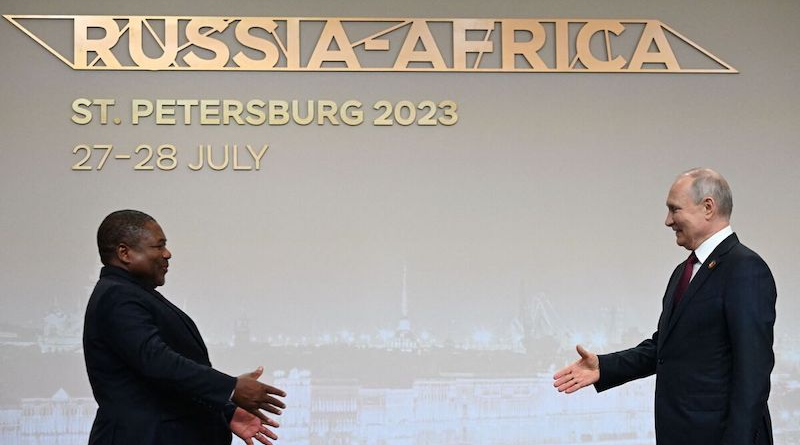Putin and Wagner Are Still Gunning for Africa
Russia has lots of friends on the continent while the West is stymied by the legacy of colonialism and Cold War abuses.
By Fletcher Dean Emeritus James Stavridis, former supreme allied commander of NATO
Last week, Russian President Vladimir Putin attempted to convene a high-level summit of African leaders in St. Petersburg. Instead of the nearly 50 invitees he hoped for — 43 had attended the most recent meeting — fewer than 20 came to this gathering. You could sense the skepticism just looking at the expressions on the faces those who did come.
Putin was facing a tough crowd. Some of the attendees appeared concerned about the fallout from the recent revolt of Yevgeni Prigozhin, founder of the Wagner Group of mercenaries, which is hugely active in Africa. Such uprisings rattle old ghosts through much of Africa, particularly in authoritarian states such as Central African Republic and now Niger, where a democratically elected government was overthrown by a military junta on July 26.
Many African countries are also deeply concerned about Putin’s decision to walk away from the Black Sea grain-shipping agreement that was negotiated by Turkey, the United Nations, Ukraine and Russia. Without Ukrainian agrarian products (including more than 10% of the world’s wheat), many nations in Africa and the Levant will find their populations hungry and restive.
Putin’s almost casual weaponization of food to further his illegal invasion is deeply resented in many African and Middle Eastern capitals. He has ignored these nations’ requests to keep the grain flowing, as well as their calls for a Ukrainian-Russian peace agreement.
Putin instead rolled out a carrot: Free deliveries of grain to six nations over the next four months — which at 25,000 to 50,000 tons is frankly a small amount (the UN World Food Programme shipped32 million tons of grain and other foodstuffs in one year under the Black Sea shipping deal). Such a meager offer is unlikely to accomplish much for Moscow. And the leaders of two of the largest nations, Egypt and South Africa, were especially vocal over the need to re-open the Black Sea trade.
So what is Putin’s new strategy for Africa? And what should the West be doing about it?
I remember when the US finally recognized the full geopolitical importance of African nations in 2007 — establishing an independent combatant command to focus on the vast continent: US Africa Command. Before then, Africa was overseen rather unenthusiastically by US European Command, which felt the real action was in Europe and at the North Atlantic Treaty Organization.
At the time, I was preparing to take command at both NATO and European Command, and I applauded the idea of having a single four-star officer supervise the military-to-military relationship between the US and the more than 50 African nations. The deputy commander at the time, Navy Vice Admiral Robert Moeller, said to me: “It’s about time we looked into the future and saw Africa.”
Putin understood that long before America did. For decades, the Kremlin has been focused on Africa, both the Arab north and the sub-Saharan south. The Wagner Group — really a complicated nexus of companies and militia groups with not-so-secret funding from the Russian state and complicit local entities — began to make serious inroads putting down rebellions, terrorist groups and political opposition in Libya, Mali, Sudan, Central African Republic and elsewhere. (Its military performance has hardly been an unqualified success.) The US tried to counter by building relationships in Niger, Kenya, Uganda and Rwanda — and through the larger entity of the African Union, headquartered in Ethiopia.
The Russians have several reasons for expanding their African footprint. They want to increase their influence in multinational organizations like the UN and its organs; 54 African nations equals lots of votes in those bodies. More important, Russia wants to engage with other centers of raw materials on the continent — creating synergies and manipulating the prices of critical resources, for example. And of course, Putin wants to push back on US influence in the region, a goal he shares with Xi Jinping’s China.
For the West, there are some fundamental complications. African nations haven’t forgotten European colonization and then opposition to their independence in the mid-20th century. They also remember Central Intelligence Agency involvement in many internal struggles during the Cold War. Putin will play on these bitter legacies.
The US and its European partners need to craft an overarching strategy for Africa. We would be unwise to try and impose our own value systems, or to force African states to choose between us and authoritarian states like Russia and China.
Instead, we should recognize that the 50-plus African countries range considerably in history, geography, resources and culture and require individual approaches within an overarching plan. The US must forge coherence and cooperation in its currently disconnected interagency efforts involving the Departments of Defense, State, Agriculture and Justice, as well as the CIA, National Security Agency and the Agency for International Development. Military training in counterterrorism can be offered — but carefully, as the last thing we want is to foment more coups or new wars.
Washington and its allies must encourage private-public cooperation in ways that can advance their policy objectives, for example through the US Development Finance Corporation. Finally, we must craft a coherent message that says in simple and direct terms that we value Africa and our partners there — something many of them doubted, particularly in the era of President Donald Trump’s derogatory comments.
Bogged down in Ukraine, Putin’s Russia is still on the move in Africa and will continue to undermine the US and its friends. We need to recognize that challenge, and make clear that we have more to offer African states than Wagner mercenaries and a piddling amount of grain.
(This post is republished from Bloomberg Opinion.)

